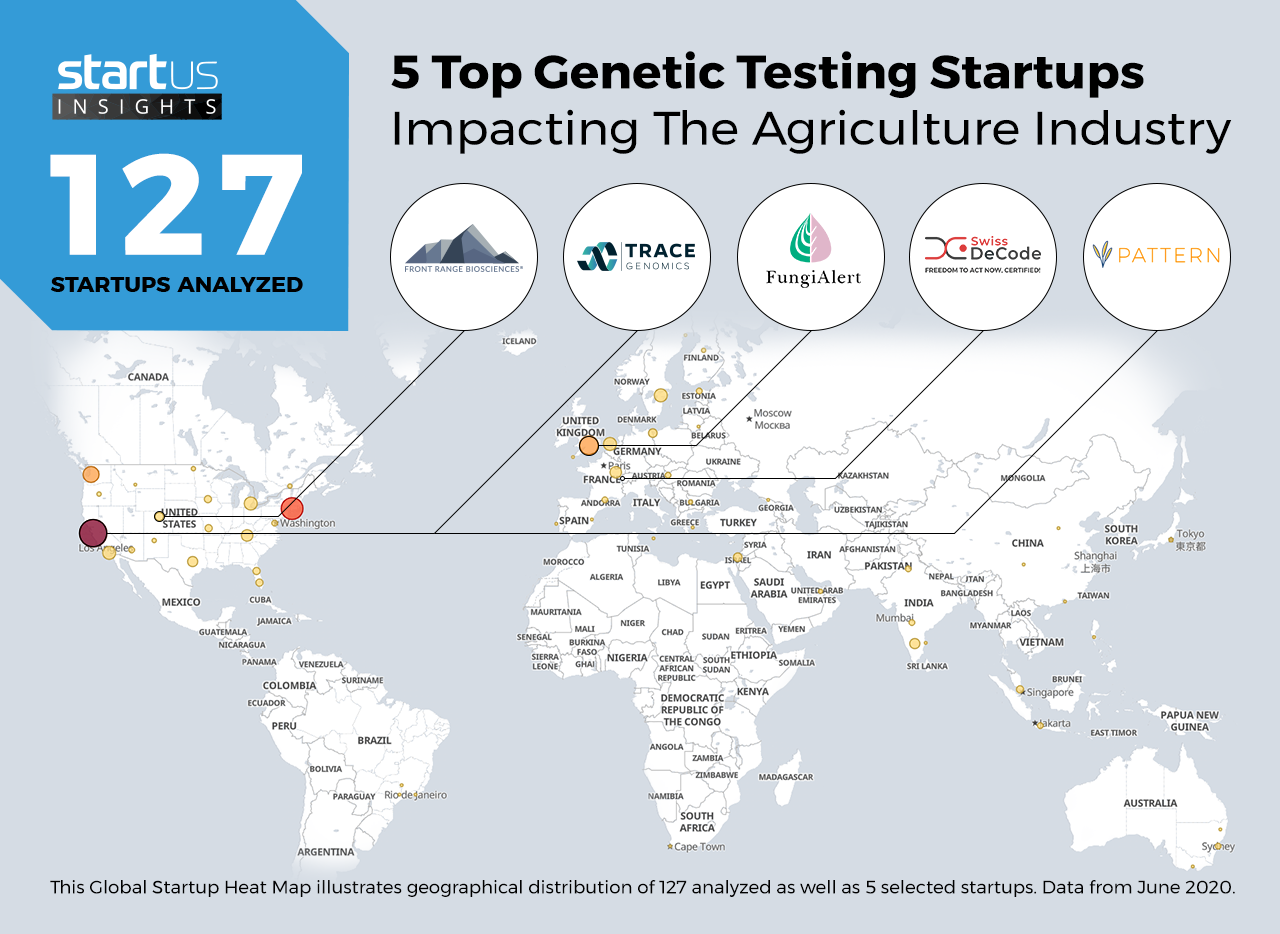Our Innovation Analysts recently looked into emerging technologies and up-and-coming startups working on solutions for the agriculture sector. As there are many startups working on a wide variety of solutions, we want to share our insights with you. This time, we take a look at 5 promising genetic testing startups.
Heat Map: 5 Top Genetic Testing Startups
Using our StartUs Insights Platform, covering 1.116.000+ startups & emerging companies, we looked at innovation in the agriculture industry. For this research, we identified 127 relevant solutions and picked 5 to showcase below. These companies were chosen based on a data-driven startup scouting approach, taking into account factors such as location, founding year, and technology among others. Depending on your specific criteria, the top picks might look entirely different.
The Global Startup Heat Map below highlights 5 startups & emerging companies developing genetic testing solutions. Moreover, the Heat Map reveals regions that observe a high startup activity and illustrates the geographic distribution of all 127 companies we analyzed for this specific topic.
Front Range Biosciences – Plant Breeding
Throughout the history of agriculture, humans have selected crops for better yield. This involves selecting for traits such as higher resistance against biological or environmental factors. Genetic testing allows agronomists to identify markers of these traits at the molecular level and make plant breeding more precise than via artificial selection.
Front Range Biosciences is a US-based startup that offers scientific tools for modern agriculture. The company combines genetic testing with phenotypic observation, including chemical profiling, to grow improved cultivars of coffee and hemp. The startup’s hemp and coffee varieties are selected for consistently high-performing genetics and valuable agricultural traits.
FungiAert – Fungicide Tolerance
Excessive use of fungicide has two potential pitfalls. Firstly, it might kill a significant portion of beneficial microbes. Secondly, it may lead to the development of fungicide-resistant pests. The judicious use of fungicides, however, achieves its objective without leading to any of these problems. Determining fungicide tolerance of a particular soil sample using genetic analysis enables agronomists to make informed decisions about fungicide use.
UK-based startup FungiAlert develops disease management solutions. The startup samples tens of beneficial microbes in the soil and performs genomic analysis on a pre-qualified pool of microbial candidates. It thereby helps farmers take important agronomic decisions related to fungicide tolerance, such as which fungicide to use and when to apply it. The solution improves the efficiency of fungicide applications and limits the development of fungicide resistance in pests.
Trace Genomics – Soil Analysis
A soil sample offers a lot of valuable information in addition to its beneficial microbes. Its biological and chemical profile affects the growth of crops grown on it. While the chemical profile is quickly ascertained with spectroscopy-based sensors, genetic testing is needed to analyze the biological profile. It informs agronomists about which crops to grow and when on any given land.
Trace Genomics is a US-based startup that develops an analytical engine for soil analysis. It extracts, sequences, and quantifies millions of microbes in a soil sample. It then uses machine learning to analyze the soil data and compare it with its large database. The startup combines this information with soil chemical data to offer customized recommendations.
SwissDeCode – Contamination Check
In agriculture, there are multiple sources at which contamination can occur. When undetected, this often leads to wastage of large acreages of crops or death of large numbers of poultry birds. Lab tests take a lot of time and are not feasible for regular monitoring. DNA-based kits offer farmers a way to perform quick genetic testing to check for any contamination or adulteration.
Switzerland-based startup SwissDeCode offers plug-and-play solutions for food safety. Their solution, DNAFoil, is an easy to use DNA testing kit that produces results in an average time of 30 minutes. The kit offers a quick method to check for contamination in irrigation water and to monitor the environment in barns. After the food is produced, the kit detects adulterants like vegetal fat or other low-quality substitutes in milk and meat.
PATTERN – Pathogen Detection
Pathogens destroy large amounts of crops every year. Unlike pathogens that reside on or visibly affect the foliage, soil pathogens are nearly impossible to detect with manual inspection. This unpredictability of pathogen load can cause widespread havoc like during the spread of the Sudden Death Syndrome (SDS). Genetic testing offers a quick method of soil pathogen detection by creating a digital fingerprint of all lifeforms in the soil and the potential threat they pose to the yield.
US-based PATTERN provides solutions to fight crop pests and diseases. The company uses the latest advances in genetic sequencing, data science, and hardware automation to obtain a digital fingerprint of soil organisms. The solution detects soil-borne insects such as rootworms and wireworms, parasitic nematodes, foliar diseases, and root rots, and stalk diseases. Furthermore, PATTERN also provides information on which pathogen populations are likely to swell during the next season and where.
What About The Other 122 Solutions?
While we believe data is key to creating insights it can be easy to be overwhelmed by it. Our ambition is to create a comprehensive overview and provide actionable innovation intelligence so you can achieve your goals faster. The 5 genetic testing startups showcased above are promising examples out of 127 we analyzed for this article. To identify the most relevant solutions based on your specific criteria, get in touch.









